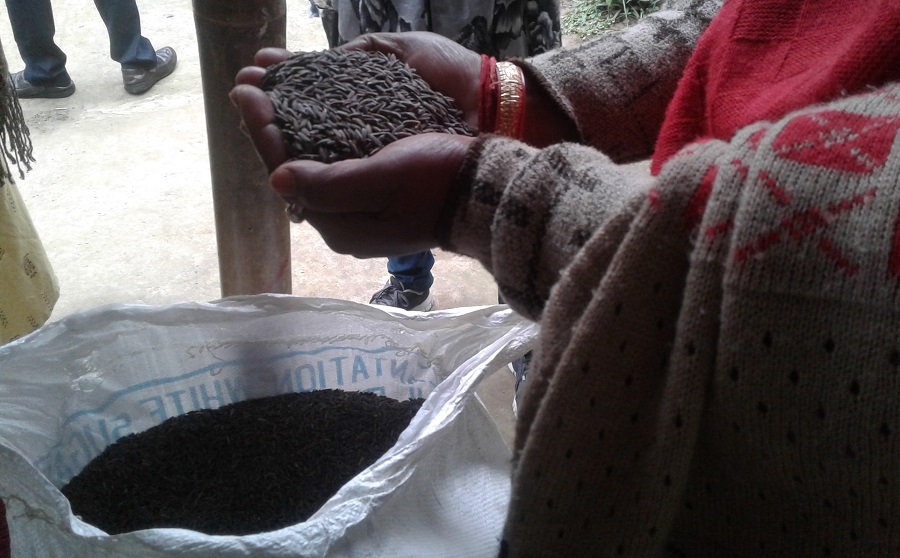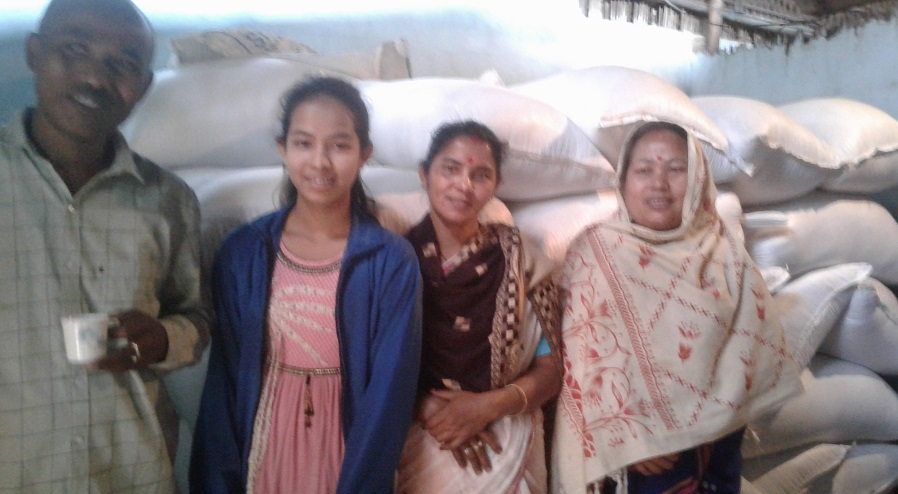Climate-smart agriculture innovations give Assam farmers hope and income
In colour psychology, purple is the colour of royalty and luxury. It also gives a feeling of trust and reliability. Of late, a purple-coloured rice variety- -Labanya-- has won hearts for its non-glutinous, high iron, high fibre and high anti-oxidant properties. The diabetic-friendly aromatic purple rice is yet another high-yielding variety developed by Assam Rice Research Institute (ARRI) under the Assam Agricultural University (AAU). Labanya hit the commercial market in 2021 and is now available on e-commerce platforms like Amazon priced at INR 350 per kilogram.
Rice is the principal food crop of Northeast India. More than 90% population of the region depends on rice as the staple food. Assam Rice Research Institute (ARRI) based at Titabar in the Jorhat district under the administrative control of Assam Agricultural University (AAU) is a premier organization in rice research. Celebrating its centenary this year, AAU-ARRI played a key role in increasing agricultural productivity and rejuvenate the farm sector with large-scale Front Line Block Demonstration in farmers’ field throughout Assam and helping farmers adopt modern technologies. The demonstrations have made high-yielding hybrid and climate–resilient rice varieties popular among farmers.

“The mandate for AAU-ARRI had been to generate technological packages through interdisciplinary research. Disseminate production technologies to the farmer’s field to increase rice productivity and sustainability by adopting applied, basic and location-specific research. AAU--ARRI has been maintaining 2500 accessions of different categories of indigenous rice cultivars and so far developed more than 40 rice varieties through its breeding program” said Dr Sanjay Kumar Chetia, chief scientist, AAU-ARRI.
Climate-smart, high-yielding rice varieties
Flooding, as well as drought, are some of the major climatic hazards of rice production during the Kharif (Sali) season and farmers in Assam cultivating traditional varieties face frequent losses. As a result, flood-tolerant, as well as drought-tolerant cultivars, are urgently needed to help mitigate loss in production. “Farmers feel lost when they lose their produce. It is like losing one’s children!” Haren Bora, a farmer from the Chaudang Pathar area in Golaghat district said.
AAU-ARRI has developed five rice varieties -- Luit, Kapilee, Dishang, Kolong and Dikhow-- suitable for both Kharif and Rabi seasons which can escape floods. “The flood-escaping variety Luit is a short-duration rice variety (90-95 days). Recommended for severely flood-affected areas and introduced as a post-flood or pre-flood crop, this variety allows farmers to go for the cultivation of 2-3 crops. Gitesh, a flood-escaping variety, can be grown with 60 days old seedlings. The plasticity of the time of planting and age of seedlings has popularized such varieties in the risk-prone areas of Assam which is more than 50% of the total rice area. Gitesh, Prafulla—are varieties developed to escape peak flood and minimize the losses,” said Dr Parinda Barua, a scientist from AAU--ARRI.
“In 2017, two new submergence tolerant high-yielding rice varieties—Ranjit Sub-1 and Bahadur Sub-1 have been developed for flood-prone areas of Assam. These varieties can tolerate submergence for up to two weeks. The grain of these two varieties are similar to their respective recurrent parents—Ranjit and Bahadur (with yield potential of about 6.5 tons per hectare). These are the first two varieties from entire Northeast India developed with the help of biotechnological interventions,” Dr Chetia, associated with developing these varieties said.
Building climate resilience of Indian smallholders
“The purple rice variety Labanya has been developed and demonstrated in Assam under an ongoing (2018-2023) international project—Resilience,” said Pompi Dutta, Development Coordinator of the project. “The emphasis of the Project implemented in Assam by AAU-ARRI is on introducing new submergence tolerant high yielding rice varieties, flood escaping and flood tolerant varieties, scaling up seed development through public private partnership (PPP), increasing the cropping intensity, encouraging dual cropping, various knowledge dissemination training on skill development, environmental awareness etc,” Dutta added further.

Project Resilience has been implemented in the two Indian states--Assam and Odisha-- highly vulnerable to climate change. In both states, the main farming system being rain-fed rice-based system, drought and floods impact food security. Around 85% of farmers are small holders in both states and extreme climatic events result in serious losses of crops and property and impact the livelihoods of millions.
“The goal of the Project is to improve agricultural productivity, adaptive capacity and livelihoods of smallholders to climate and economic challenges by building resilience and strengthening market value chains, food & nutritional security and address UN Sustainable Development Goals, reduce negative environmental impacts and enhance sustainable agricultural intensification in India,” said Dr Ramasamy Rajkumar, principal scientist, MS Swaminathan Research Foundation (MSSRF) a partner in the Project. Other collaborators of the Project include the Royal Norwegian Embassy in New Delhi, the Norwegian Institute of Bioeconomy Research and the International Water Management Institute (IWMI).
Project Resilience and Climate Smart Agriculture
Chronic floods, flash floods and longer dry spells even in once-known wet areas have created many challenges for farmers in Assam. Based on these adverse climatic conditions, Sivasagar and Golaghat districts in Assam were selected as study areas under the Project. A census followed by a sample survey was conducted in the villages with support from IWMI to identify the most critical challenges and threats the farmers were facing. Only after that comes the selection of the most relevant Climate Smart Agriculture (CSA) interventions.
Climate Smart Rice practices is an approach for the cultivation of rice with various suitable methods like--System of Rice Intensification (SRI), Alternate Wetting and Drying (AWD) and Direct Seed Rice (DSR). To popularize the SRI technology among small farmers against climate risks, demonstration was initiated under Project Resilience in areas of Golaghat district -- an intermittent drought-prone area.
Hemanta Das, a farmer from village No 3 Gomariguri, in Golaghat district, in whose field the demonstration was carried out during Kharif season in 2020 said, “I used the rice variety Bahadur Sub-1 and could harvest a production of 9 tons per hectare under SRI compared to 5 ton per hectare under conventional practices”. The beneficiary farmer also found the fields ready for harvest which is one month in advance to the traditional harvesting season. “We are happy to see the flow of money in this otherwise drought-prone area where once all our toil and hopes would come to nought,” Hemanta’s wife Anjali Das told us.
Climate-smart varieties Ranjit Sub-1, Bahadur Sub-1, Luit and Shraboni were introduced as alternatives for the chronically flood-affected district of Sivasagar. Shraboni (TTB-404) is a medium-duration rice variety (130-140 days) recommended for double cropping. The introduction of this variety augmented farmers’ income and has been widely accepted by farmers of the district.
Creation of a smart seed production hub
With challenges of livelihood, smallholders in Assam also face a lack of knowledge of recent agricultural technology and a lack of adequate market opportunities. AAU-ARRI tried to deal with these challenges by setting up Village Knowledge Centres (VKC) in Project sites to carry out various knowledge dissemination activities. Small-holding farmers—who remain the bedrock of agricultural and food supply chains need extension and advisory services. Farmers find a quick responses to their problems through Information Communication Technology (ICT) based tools. Phone-in programmes, video conferencing, WhatsApp group for dissemination of advisory, data, weather forecasts, and information on pests and diseases remain vital for knowledge gain and adoption of CSA technologies.
Through the VKCs local private seed organizations came forward to purchase seeds from the project villages. A Farmer-Producer Company (FPC) Chawdang Pathar Farmer Producer Company Ltd was launched at Chawdang Pathar in Golaghat district and soon some 550 farmers started seed production in a total seed production area of 4,000 bighas creating a smart seed production hub.
With better quality seeds given for demonstration plots, the production also increased. In 2019, about 300 tons of rice seeds have been produced and the targets have subsequently been raised over the years.
“In 2021, the purple rice Labanya was first demonstrated in the field of only three farmers. The total production was some 2000 kilograms (kg) and the farmers got Rs 30 per kg at a time when the minimum support price (MSP) had been Rs 19.40 per kg only. Considering the huge success, more farmers were attracted and the following year saw some 55 farmers cultivating the high-yielding variety,” said Milonjyoti Konwar, a scientist from AAU-ARRI.
It was the interest shown by farmers in technical know-how, market information and precision-based farming techniques that have been the game changer. Above all, these farming communities once equipped with only traditional knowledge have accepted the need for capacity building and training that has helped them adapt to the climate change risks.

